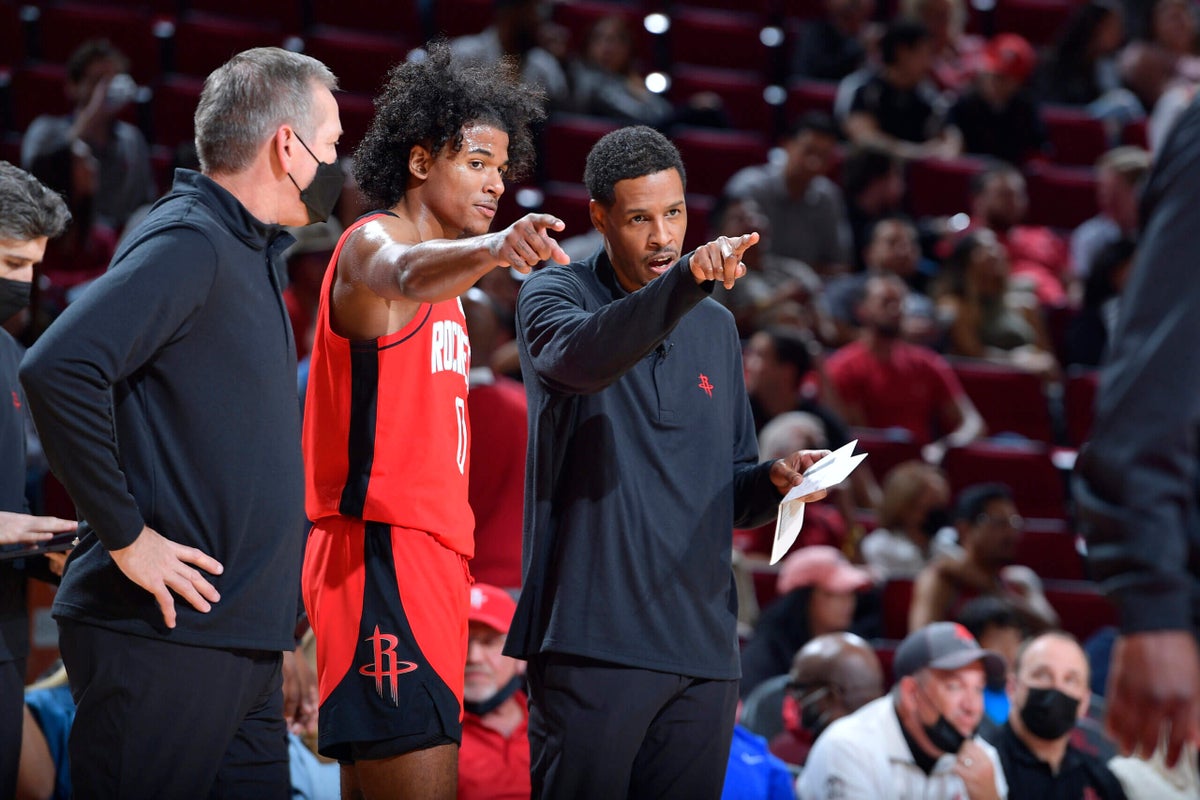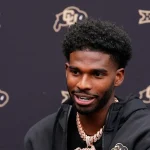

Two weeks ago, when the Houston Rockets clinched their first NBA playoff berth in five years, there was a desire to put things in perspective.
It was a full-circle moment for ownership and a front office that took on the painstaking challenge of a rebuild spawned from a bad situation, thrust into the unknown.
Advertisement
It was also a full-circle moment for players like Jalen Green, Alperen Şengün, Jabari Smith Jr. and Tari Eason, who endured years of dwelling in the Western Conference basement and a fight-or-flight environment.
It was even a moment for the city and its fan base, most of whom chose to stick by their team and can now celebrate a return to relevancy.
But another person needed to reflect: former head coach Stephen Silas, who coached the team from 2020-23, a tumultuous period in the Rockets’ recent history. The 51-year-old inherited an inexperienced group of players at the height of the COVID-19 pandemic. To see them accomplish a playoff berth with his replacement, coach Ime Udoka, was still gratifying.
“It was a feeling of pride,” Silas said in a recent phone conversation. “I was so proud of those guys. To see where they came from and to reach the heights that they have, just so excited and happy. When we went through it, there was a lot of adversity, a lot of losses and downtime. But to see that those guys fought through it and the great job that Ime has done with the team, I’m just really happy for those guys.”
When Silas assumed the role before the 2020-21 season, he was under the impression that, as Mike D’Antoni’s replacement, he would be tasked with constructing an innovative offense centered around James Harden and Russell Westbrook. But shortly after Silas’ arrival, Westbrook was traded to the Washington Wizards, and Harden forced his way out of the organization to the Brooklyn Nets. The following offseason, Houston drafted Green and Şengün, and Silas became the face for what would become the Rockets’ rebuild.
It didn’t take long to realize the fit between a coach who primarily dealt with veterans and raw, inexperienced players was awkward at best. Over Silas’ three seasons at the helm, the Rockets ranked in the bottom five in both offensive and defensive efficiency, unable to put a quality product on the floor.
Advertisement
The locker room was tense, with several disagreements not only among teammates but with members of the coaching staff as well — the latter of which led to internal suspensions for Kevin Porter Jr. and Christian Wood. Longtime NBA veteran Eric Gordon was the most vocal about his displeasure with the state of the team, often bemoaning the lack of discipline or structure, all of which fell at Silas’ feet.
Over the next three seasons, Houston would lose 177 games, finishing last in the Western Conference on two of those occasions. In the end, Rockets ownership deemed it necessary for the team to head in a different direction, desperate to reverse course.
The Rockets’ biggest issues stemmed from a lack of leadership around the youthful core, quite the contrast from Udoka’s teams. And for as vast as Silas’ experience stretched — he was largely responsible for engineering efficient offenses in Dallas, Charlotte and a few other teams — not having the right mix of veterans around the young core came at a cost.
Fred VanVleet, Dillon Brooks and Steven Adams have played significant roles for the Rockets this season, and others like Aaron Holiday and Jeff Green have provided consistency when their numbers have been called. But their collective professionalism has been an underlying factor in Houston’s success.
“It was difficult having all the young guys together,” Silas said. “But that’s what they had to go through to get to where they are now. I enjoyed teaching, being around those guys on a daily basis, the film sessions, practices and dinners — all the different things that we did together as a group. To see the growth they had after I left … it didn’t have to go that way. But they put the right pieces around them. That’s super important to have guys they can look up to.
“And it’s not even the vocal part. It’s the modeling, the toughness, the defensive mindset, the importance of every possession. Having the right people in the locker room certainly helps.”
Advertisement
Silas is pleased to see all four players who were a part of his rotation are still integral pieces under Udoka, but he perks up when discussing Green and Şengün. Under Udoka, it’s commonplace for his assistants to go over game film with the players, but Silas took it upon himself to teach, constantly seen with a laptop in his lap and Green in the adjacent seat.
With Şengün, his approach was a bit different. From the onset, Silas was quite demanding (especially defensively) of his young Turkish center, holding him to a high standard. In some extreme instances, like starting Wood and Bruno Fernando over him, Silas hoped to light a fire under Şengün. But the consistent theme in Silas’ discussions of Şengün was that he wouldn’t tolerate a lack of effort because he knew how cerebral of a talent Şengün was. This season, Şengün earned his first All-Star selection and has cemented himself as a top center in the NBA, shedding the defensive liability label that plagued him earlier in his career.
“It was just the importance of learning how to be a starting center in the NBA,” Silas said. “Trying to use all of his gifts and explore his game. I’m so proud of him, what he’s done and the growth he’s had — especially on the defensive end. Just being able to recognize what’s coming and anticipating.”
The Rockets will face the Golden State Warriors in the first round of the playoffs after they defeated the Memphis Grizzlies in the Play-In Tournament on Tuesday. There are still concerns about Houston’s viability in the playoffs, particularly with its lack of experience, lack of consistent outside shooting and a true No. 1 option. But Silas doesn’t see a team primed for an upset. He sees a team that excels at controlling the glass, with Houston leading the league in offensive rebounding (14.6), similar to how it did in Silas’ final season in 2023 (13.4). But perhaps more importantly, Silas understands the Rockets’ defense, which has been a top-three unit all season, is physical, dangerous and connected.
“I see a together group for sure,” Silas said. “A group based on the defensive end. Ime has done an amazing job getting those guys to buy in on the importance of defense and how it can lead you to where they are right now. The veteran leadership takes some of the pressure off the younger guys to where they can do their thing and have someone else that has the know-how. (General manager Rafael) Stone has done a really good job drafting the right guys and then getting the right guys around them. It’s really cool.”
Silas, who was happy to talk basketball, also spoke about his recent stint with Team USA, connecting with players searching for their next home, similarly to him. But every topic had a Rockets-centric theme to it. He still has gratitude for his time in Houston. And while he waits for his next opportunity, he’ll be cheering on the Rockets in the postseason.
“I think I played a small role,” Silas said. “I don’t know how big a role (it was). They’d probably be able to answer that question better than me. But I tried to do things the right way. I tried to nurture those guys, teach them the right way to do things and fight the adversity. It was a really tough time. But it paid off for them. So I’m thankful for the time I had with them.”
(Photo of Stephen Silas and Jalen Green: Logan Riely / NBAE via Getty Images)
This news was originally published on this post .









Be the first to leave a comment